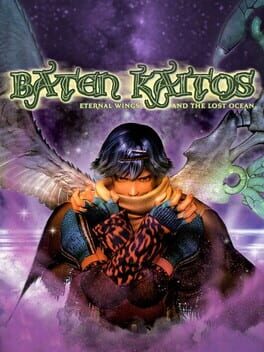Baten Kaitos, the project of Xenosaga's developer Monolith Soft and tri-Ace's sound designer tri-Crescendo, was unique in pairing the collection, strategy and customization of TCG's with JRPG combat. By themselves, the cards are not particularly inspired. Limited to simply replicating battle actions, it's the interactions between their properties that form the core of the battle experience, with bits of active gameplay (each turn, players choose a number of cards within a time limit) and a set of powerful, unlockable special moves that somewhat recall the element-driven combos of Persona 2 & Breath of Fire IV. But that influence reveals another problem: Combat's card game integration consists of a few poker mechanics and little else. It's undoubtedly an interesting fusion, but one that's only half-realized.
They fare better in the non-combat areas. Best of all is how JRPG traditions are repurposed to revolve around their card-centric program, from shops to equipment, to enemy loot and hidden collectibles. Also of note are some truly original concepts like temporary cards (that may transform over time) and blank cards - key items that can mimic parts of the environment to complete objectives. On the downside, Monolith Soft leans too much towards the lengthy, slow-burn format once more, repeating the same mistakes that detracted from Xenosaga: Everything from cutscenes (although not as extreme) to battles, animations and movement border on plodding. If that largely remained the same, the writing couldn't be more different. The addition of Masato Kato (script writer for many Square titles, including Chrono Trigger and Final Fantasy VII) marked a newfound penchant for weird scenarios, locations and humor; alongside effective story moments and a mishmash of aesthetics (part steampunk RPG, part stylized medieval-fantasy a la Fire Emblem, part Chrono Cross-ian naturalistic fantasy). Sadly, much of that talent is wasted on a rather tedious second half.
They fare better in the non-combat areas. Best of all is how JRPG traditions are repurposed to revolve around their card-centric program, from shops to equipment, to enemy loot and hidden collectibles. Also of note are some truly original concepts like temporary cards (that may transform over time) and blank cards - key items that can mimic parts of the environment to complete objectives. On the downside, Monolith Soft leans too much towards the lengthy, slow-burn format once more, repeating the same mistakes that detracted from Xenosaga: Everything from cutscenes (although not as extreme) to battles, animations and movement border on plodding. If that largely remained the same, the writing couldn't be more different. The addition of Masato Kato (script writer for many Square titles, including Chrono Trigger and Final Fantasy VII) marked a newfound penchant for weird scenarios, locations and humor; alongside effective story moments and a mishmash of aesthetics (part steampunk RPG, part stylized medieval-fantasy a la Fire Emblem, part Chrono Cross-ian naturalistic fantasy). Sadly, much of that talent is wasted on a rather tedious second half.
